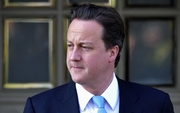 The Tory conference in Birmingham is the last big political event before the cuts come. After the 20th, every time a senior Tory appears in public for the next few years they will be about why this or that is being cut. As the row over defence shows, these questions will come from right across the spectrum.
The Tory conference in Birmingham is the last big political event before the cuts come. After the 20th, every time a senior Tory appears in public for the next few years they will be about why this or that is being cut. As the row over defence shows, these questions will come from right across the spectrum.
For this reason, Simon Schama’s interview with Cameron in today’s FT is probably one of the last that will start with the assumption that Cameron is genial, non-ideological fellow. Once the cuts are happening, it will be harder to cast Cameron as a consensual figure. His edges will appear harder, more defined.
But when Schama asks Cameron what he wants his legacy to be we get a reminder of how non-ideological Cameron is. The PM gives the rather saccharine reply that he wants the country to be a “better place for children to go to school in, to grow up in.” It is the kind of political statement that no one could disagree with.
Yet, revealingly, Cameron’s route to producing those better schools is distinctly ideological. It is based around the idea of a supply-side revolution in education and a firm belief that choice and competition are what will drive up standards.
This is the paradox of Cameron. A Prime Minister who is so determined to present himself as a non-ideological figure, who even appears disdainful of it is actually leading a highly ideological government.







Comments